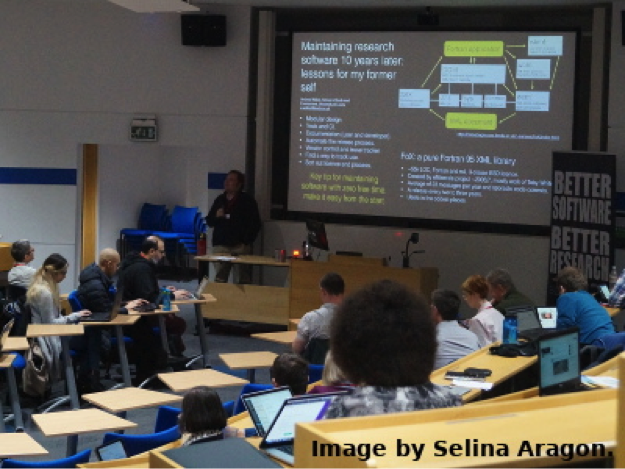Announcing the first batch of Collaborations Workshop 2018 mini-workshops
Posted on 26 January 2018
Announcing the first batch of Collaborations Workshop 2018 mini-workshops
Posted by s.aragon on 26 January 2018 - 8:17am
 By Raniere Silva, Community Officer.
By Raniere Silva, Community Officer.
The mini-workshops & demos are key activities in all our Collaborations Workshops. Each session lasts 30 minutes, in which attendees share a particular software product, approach, standard, etc.
Some mini-workshops & demos are very hands-on and at the end of Collaborations Workshop learners are confident to use the software, approach or standard on their daily work. Others present something earlier in the day, and the audience engages in a constructive discussion with the presenters which sometimes leads to some ideas for the hackday on the third day of the Collaborations Workshop.
Highlights from the Collaborations Workshop 2016 mini-workshops & demos were Robin Wilson's hands-on introduction to recipy, Oliver Laslett's hands-on validation of Jupyter notebooks with nbval and Clemence Tanzi's, from qLegal, discussion about public domain licensing and liability.
The highlights of 2017 edition were Neil Chue Hong's demonstration of the Software Assessment Framework, Edward Smith's hands-on session covering pyDataView, and Jonah Duckles's step by step session on creating a lesson the Software Carpentry/Data Carpentry way.
For Collaborations Workshop 2018 (CW18), we expect to have more fantastic mini-workshops & demos and we’re excited to announce the first four: "Making research software easily citable with the Citation File Format" with Stephan Druskat, "Code is Science—open source scientific code manifesto" with Yo Yehudi, "Python testing with pytest" with Matt Williams, and a session related to Overleaf, one of our Platinum Sponsors, with John Lees-Miller and Villy Ioannou.
Stephan and others started discussing the Citation File Format for software during Workshop on Sustainable Software for Science: Practice and Experiences 5.1 (WSSSPE5.1) and wrote a post for our blog. We believe this will help change the culture of how we credit software in the years to come. Yo and her colleagues have been working together over the last few years to create an Open Source Code manifesto outlining the importance of open source code in science. We are delighted to host Yo to foster this discussion and add to the one that she hosted at MozFest2017.
Testing your code is important and if you’re coding with Python, you’re probably using pytest. If you aren't using pytest yet, Matt's demo will be a great way to start doing so. Finally, Overleaf is a cloud-based LaTeX editor that will boost productivity for anyone working with LaTeX. So, why not discover ways to make the most of it with Jonh and Villy?
In a couple of weeks, we will announce the full list of mini-workshops & demos at CW18. For now, you can find more information about them at the CW18 page.
Register on the CW18 Eventbrite page
